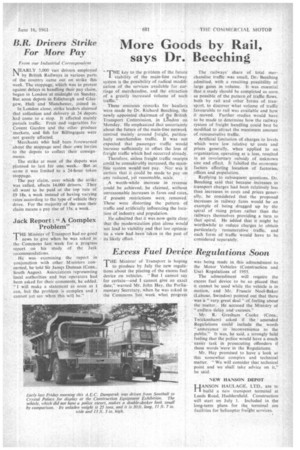More Goods by Rail, says Dr. Beeching
Page 35

If you've noticed an error in this article please click here to report it so we can fix it.
THE key to the problem of the future viability of the main-line railway system is the possibility of radical modification of the services available for carriage of merchandise, and the attraction of a greatly increased volume of such traffic."
These ominous remarks for hauliers were made by Dr. Richard Beeching, the newly appointed chairman of the British Transport Commission, in London on Monday. He emphasized that uncertainty about the future of the main-line network centred mainly around freight, particularly nterchandise traffic. It was not expected that passenger traffic would increase sufficiently to offset the loss of freight traffic which had occurred already.
Therefore, unless freight traffic receipts could be considerably increased, the mainline system would -not pay. Nor wa's it certain that it could be made to pay on any reduced, yet reasonable, scale.
worth-while increase in revenue could be achieved, he claimed, without unreasonable increases in fares and rates,if present restrictions were, removed. These were distorting the pattern of traffic and artificially influencing the location of industry, and population.
He admitted that it was ,nowquite clear) that the modernization plan atone would not lead to viability and that too optimistic a view had been 'taken in the past of its likely effect. The railways' share of total merchandise traffic was small, Dr. Beeching admitted, with a resulting possibility of large gains in volume. It was essential that a study should be completed as soon as possible of the pattern pf traffic flows. both by rail and other forms of transport, to discover what volume of traffic favourable to rail was available and how it moved. Further studies would have to be made to determine how the railway system of freight handling could best be modified to attract the maximum amount of remunerative traffic.
Artificial limitation of charges to levels which were low relative to costs and prices generally, when applied to an organization operating at a loss, resulted in an involuntary subsidy of unknown size and effect. It falsified the economic Factors affecting location of factories, offices and population. •
Replying to subsequent questions. Dr. Beeching said that because increases in transport charges had been relatively less than increases in costs and prices generally, he considered that the proposed increases in railway fares would be an example of being dragged up by the spiral of rising prices .rather than the railways themselves providing a turn to that' spiral. He added that it might be worthwhile to reduce charges to obtain particularly remunerative traffic, and each form of traffic would have to be considered separately.




















































































































